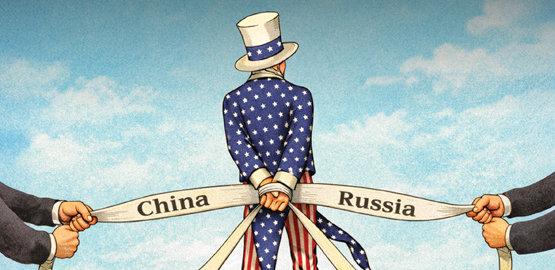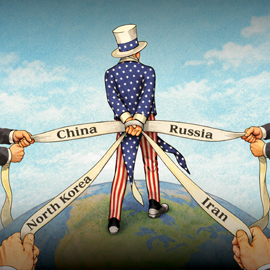News
How to Restore America’s Dominance in Technology
“We believe that the people of this country have a right … to find out why a nation with our vastly superior scientific, economic, and military potential is being at the very least equaled and perhaps surpassed by a country that less than two decades ago couldn’t even play in the same scientific ballpark. They also have the right to make decisions as to whether they want their government to maintain our current leadership of the free world regardless of the cost in dollars and sweat.”
These words, written in aftermath of the United States’ strategic surprise from Sputnik, ring true again today. Facing growing scientific and technical competition, Congress and President Eisenhower enacted the 1958 National Defense Education Act, increasing Science, Technology, Engineering, and Mathematics (STEM) talent to invigorate American competitiveness and win the Cold War. Today, we face a similar problem in key technical fields that underpin both military and economic competitiveness.
There is no single, unilateral action that will restore American dominance in technology. Progress requires both aggressively attracting the world’s talent to the United States and cultivating our own domestic talent. The United States may buy time in the immediate and near-term through much-needed immigration reform, while parallel educational reforms – driven by realigned incentives – take hold. We support liberal education and immigration policies for illiberal reasons: We want to win the long-term strategic competition with China.
The winds of both politics and history are blowing in the right direction, as Congress is set to debate bills on competition and talent. Among other things, the proposed United States Innovation and Competition Act (USICA) would remove green-card limits for those with STEM degrees. To date, legislative efforts to increase STEM participation have been mixed. Some members of Congress have pushed to increase S&T funding, but without clear outcomes. One recent proposal would have granted $100B over five years to the National Science Foundation, including an expanded focus on applied research, but was subsequently watered down.
Instead, we propose that Congress take a multi-pronged approach, using existing pipelines and programs, which will afford much better long-term results for America.
Putin’s War and European Politics (with Nick Cohen)
Eric and Eliot welcome Guardian columnist and Spectator blogger Nick Cohen (no relation to Eliot) and author of the several books including What’s Left? They discuss the impact of Putin’s war on Ukraine on European politics, the role of anti-Communism and anti-Fascism in post-war Europe, the transformation of the Labour Party under Keir Starmer, why Russian money in London was unable to purchase durable policy outcomes from the Conservative government under Boris Johnson, the prospects for democratic politics, and the likely outcome of the war in Ukraine.
Nuclear Weapons and Arms Control: Old Myths and New Realities
It’s been a difficult few months for the so-called arms control community. Cherished myths and deeply held beliefs have been dashed by Russian, Chinese, and North Korean behavior. Reciprocity has been demonstrated to be an empty concept. And yet the alluring illusions persist. It’s time to sweep the hoary old folktales away and confront the new realities.
Finland and Sweden Deserve to Be in NATO Now
After months of anticipation, Finland’s President Sauli Niinisto and Prime Minister Sanna Marin announced Thursday their country’s intention to apply for membership in NATO, and neighboring Sweden is not far behind. In polling last fall, only about a fifth to a quarter of Finns and Swedes supported their respective countries joining NATO. After Putin’s premeditated, unprovoked, and highly scripted invasion of Ukraine on February 24, there has been a massive movement of public opinion towards joining the alliance. In Finland, the numbers supporting membership jumped to 53 percent, then 62 percent, and a poll earlier this week measured 76 percent support with only 12 percent in opposition. The swing in Swedish opinion has been less dramatic, but still emphatically shows a majority (57 percent in April) supporting NATO membership for the first time.
A Comprehensive Triad for Space Resilience – More than Just Numbers
Defense Department and Space Force leaders have increasingly emphasized space resilience as the key to space superiority. Previous efforts developed taxonomies for space resilience and considered differences between mission resiliency and system resiliency. In 2016, then deputy assistant secretary of defense for space policy, Douglas Loverro, specified six major investment areas to enhance space resilience: disaggregation, diversity, distribution, deception, protection, and proliferation and urged that “we need to exercise all six of those different kinds of resilience…[to] get the true resilience we want.”
Taken together, these ideas offer three approaches to resilience: proliferation, reconstitution, and retaliation. To date, DoD’s approach to resilience has been overly focused on resilience through proliferation. To meet the threat to U.S. space systems, DoD needs to broaden its approach to resilience to fully embrace reconstitution. DoD also should think further about deterrence through the threat of retaliation, especially non-kinetic-based deterrence by punishment approaches that are already feasible and mutually reinforcing to reconstitution and retaliation. Although DoD and Space Force leaders have begun talking about the need for rapid replenishment of space constellations, the department needs to accelerate investment and acquire the needed capabilities for reconstitution and retaliation to shore up the space resiliency triad.
Shield of the Republic: The War’s Decisive Moment
Eric and Eliot dissect the war in Ukraine and discuss Eliot’s articles in the Atlantic and Foreign Affairs. What is the new phase of the war? Are Russian forces exhausted, what is their strategy? How will the Ukrainians counter? Is the Biden package enough? Eliot asks Eric about the lessons of Ukraine for other parts of the world and his Bulwark article on ending the policy of strategic ambiguity for Taiwan. Should we settle in for a long war of attrition?

























